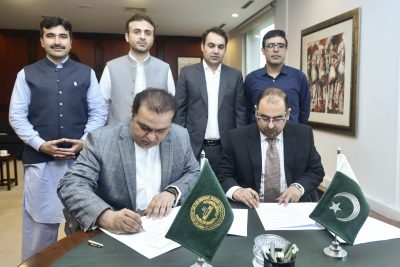
The Pakistan Institute for Parliamentary Services (PIPS) and the Competition Commission of Pakistan (CCP) signed a historic Memorandum of Understanding (MoU) on August 8, 2025, at the PIPS campus in Islamabad, marking the beginning of a strategic partnership to foster institutional cooperation, joint research, and capacity building.
Under this MoU, both institutions agreed to collaborate on organizing joint educational events on topics of mutual interest, as well as share research data, publications, and expertise to strengthen evidence-based policymaking. The agreement also envisions the exchange of trainers, experts, and professionals, along with joint research projects.
Mr. Asim Khan Goraya, Executive Director PIPS, informed that PIPS provides research, capacity building and legislative services to the Honourable Members and the secretariat staff. He further said that through an amendment in PIPS Act in 2020, the Institute is also mandated to conduct training programs for civil servants on parliamentary affairs, and the Institute may arrange training sessions for CCP officers to enhance their understanding of Parliamentary knowledge. He hoped that such collaboration will not only build the capacity of CCP officials but also create avenues for continued professional development and knowledge exchange between the two institutions.
Mr. Salman Amin, Member CCP, while appreciating the efforts of PIPS in providing parliamentary knowledge and capacity building to the Honourable Parliamentarians, requested PIPS to arrange dedicated training sessions for CCP officers on the working of Parliament. CCP also desired that a slot in PIPS capacity building may be allocated so that Honorable Members may be orientated on the Competition Act. He further expressed interest in training CCP officers in batches to ensure broader institutional benefit.
Both sides reiterated their commitment to maintaining regular coordination and expressed confidence that the partnership would enhance policy discourse on competition, regulation, and governance while contributing to the development of informed, research-based decision-making in Pakistan.
The signing of this MoU marks a significant step towards building sustainable linkages between the two institutions, fostering mutual cooperation, and promoting the culture of knowledge-sharing for national development.